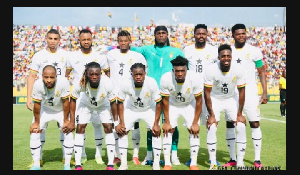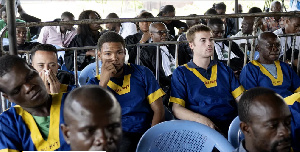- Home - News
- Polls
- Year In Review
- News Archive
- Crime & Punishment
- Politics
- Regional
- Editorial
- Health
- Ghanaians Abroad
- Tabloid
- Africa
- Religion
- Election 2020
- Coronavirus
- Photo Archives
- News Headlines
- Press Release
Press Releases of Wednesday, 8 September 2021
Source: Ghana Publishers Association
Functional literacy through the digital experience
The Ghana Publishers Association celebrates World Literacy Day on Wednesday 8th September 2021 under the theme: “Functional Literacy through the Digital Experience.”
This year’s theme crafted by the Association invites all practitioners in the book industry and stakeholder organizations to reflect on two key concepts: Functional Literacy and Digital Experience. How do we as a nation use digital technology to advance functional literacy among children, young adults, and even adults?
Reading over the years has offered us the incentives of mental and analytical development. We have been privileged to have thoughts of great writers and thinkers still with us through books. The boundaries of information and communication accessibility have been broadened by the introduction of the computer and the internet. Today, on a bright screen you can access thousands of literary materials, developmental designs, and concepts by which you learn from and progress.
Literacy continues to be a challenge in Africa. We are witnessing the declining quality of our education and culture. UNESCO (2019) studies that “Despite progress made, literacy challenges persist with at least 773 million adults worldwide lacking basic literacy skills today”.
According to the 2018 World Development Report, nearly 80 percent of Ghana’s working-age population have just level 1 literacy or below— that is, their literacy proficiency is limited to understanding basic texts, but they are not able to integrate, evaluate, or interpret information from a variety of text materials.
This and many pieces of research do not reveal satisfactory results on Ghanaian literacy. It is, therefore, a priority that we develop appropriate strategies to change the situation.
Governments are elected to serve one purpose: To improve the lives of the people! Governments are by the democratic contract enjoined to accelerate the transformation of the lives of the people through appropriate policies. The fundamental policy is to empower the people to be functionally literate.
The old definition of literacy where the mere ability to read and write was the qualification for being literate is no more. Today, literacy is about life. It is the embodiment of human dignity and right.
The ability to transform your environment to suit your lifestyle and contribute to the progress of society is the new definition.
Therefore, our educational policies and directions must be couched to ensure that the population has enlightenment to continue the improvement of their lives and status after formal education.
The missing link is the commitment by governments to the objective of providing teaching and learning materials to support the agenda of providing quality education and improvement of the lives of the population.
Reading is important, it is the very foundation of life. In today’s world, no one can live without being able to read, write and apply the knowledge acquired.
As an individual, you are confronted with reality as you grow. You must notify your environment and find innovative ways to adapt.
One of the tested and most potent ways is your ability to read what you see, write effectively, and translate them into functional activities.
Reading is an exciting adventure. It is a journey of openness and empowerment. When you can read you feel empowered and emboldened through life. You have control of your thoughts and could blend different cultures and situations for change in your life.
There is no alternative to reading. There are so many ways that one can change his or her environment or situation but not without reading. Today, it has become a part of us. In fact, it is no more a privilege but a natural right. In our world of interconnectivity and literacy, we read for life, for health, for food, and in fact for a good life.
This is what must be intended for our young ones. We must encourage them and inculcate reading and analytical skills in their life.
We admonish parents and educational authorities to make reading materials available for the children to access. They must be enabled to enjoy every right there is.
After the Second World War, it became evident, the urgency to accelerate literacy across the globe. A global strategy was therefore needed to approach the challenge.
This brought about the launch of World Literacy Day in 1965 by the United Nations Educational Scientific and Cultural Organisation (UNESCO). The first global celebration was in 1966 and since then, it has been an annual celebration.
The objective of this special day is to bring to the fore, the importance of literacy to individuals, communities, and nations.
UNESCO anchors the celebration on achieving faculties to develop economic status and general well-being and inculcating values of national integration, conservation of surroundings, fairer gender equality, observance of standard family traditions, etc.
It is, therefore, appropriate to consider literacy as a strategy for the development and acceleration of human initiatives and creativity. More attention should be focused on the development of the child to enable them to acquire the skills of writing, reading, and analytical skills development at an early age.
Since independence, Ghana has exhibited the national and political desire to promote educational and cultural development.
Almost every forum on education has emphasized the important role an educated citizenry could play in the national developmental effort. Governmental organizations and private enterprises do acknowledge reading and literacy as the foundation for national development.
This is evident in the number of private educational institutions and international organizations participating in reading and literacy programs in Ghana, complementing the government’s efforts to attain a high level of functionally literate citizens.
One phrase that has been echoed many times by experts, government functionaries, social leaders, and groups is “Education is the key to national development “. It is an acceptance by all, of the strategic role education and literacy, with the right motivation, could play in our quest for accelerated national development.
Since independence, political authority has made it a national desire to raise the standards of Ghanaians to ultimately assume the lead role in the development of our nation politically, economically, and socially. Education as the key to national development has therefore been an attempt to psychologically motivate the citizenry to embrace the concept of compulsory education.
The measurement of the level of the Ghanaian to appreciate the formal learning of subjects and English was termed Literacy. It was therefore very convenient for educationists and political leaders to refer to those who have gained formal education as literate. However, the achievement of formal education cannot be equated to literacy. Even though we admit that formal education is part of functional literacy.
The current social challenges of filth, ignorance, intolerance, etc are all products of an illiterate society. We have not been able to transform ourselves into the desired citizens that education had envisaged. This is all because we have left reading and literacy out of the various education reforms so far.
Presently, we have an opportunity to escalate the improvement of the citizenry of their functional literacy skills. The digital experience will help us deepen the process of creating an environment that allows the use of digital technology and other supporting innovations to enhance the knowledge and livelihood improvement of the citizens.
We encourage the government to review its literacy promotion activities including, institutions that are supposed to facilitate the reading and literacy experience through the introduction of appropriate digital innovations for optimum effect. Government must also consider a comprehensive sensitization program for all ministries and departments to promote literacy through their activities.
God bless our efforts.











